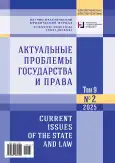Russian carbon market: legal framework, problems of development and digitalization
- Authors: Kostikova E.G.1
-
Affiliations:
- Lebedev Russian State University of Justice
- Issue: Vol 9, No 2 (2025)
- Pages: 196-207
- Section: General Theory and History of Law and the State
- URL: https://journal-vniispk.ru/2587-9340/article/view/295321
- DOI: https://doi.org/10.20310/2587-9340-2025-9-2-196-207
- ID: 295321
Cite item
Full Text
Abstract
Russia enforces climate legislation, which stipulates the emission and circulation of carbon units. This is a new economic instrument that is subject to circulation in the market and in the future can be “digitized”. This study evaluates the results of the application of this innovation, considers the prospects of digitalization of the carbon sphere in order to improve legal regulation. It is established that the emission of a significant amount of carbon units has taken place, but the market of carbon units, in particular, organized, has not formed, which does not allow to effectively use the potential of this market instrument. It is concluded that this result is due to the postponement of the introduction of restrictions on carbon emissions, and, as a consequence, low demand for carbon units. New amendments to tax and climate legislation, aimed at stimulating the market for carbon units, will not affect the situation. Facts of digitalization of the results of unregistered climate projects have been established. Taking into account foreign experience, it was concluded that in the absence of legal regulation, such activities are fraught with technological, economic and legal problems. The directions of improvement of the current legislation are outlined, which require the definition of civil legal characteristics of carbon units, as well as other results of the implementation of climate projects.
About the authors
Ekaterina G. Kostikova
Lebedev Russian State University of Justice
Author for correspondence.
Email: keg2003@bk.ru
ORCID iD: 0000-0002-0605-2579
Dr. Sci. (Law), Associate Professor, Professor of Financial Law Department
Russian Federation, 69 Novocheremushkinskaya St., Moscow, 117418, Russian FederationReferences
- Sitnikov S.L. (2022). Carbon regulation in Russia: origins and peculiarities. Vestnik evraziiskoi nauki = Bulletin of Eurasian Science, vol. 14, no. 6, pp. 2-9. (In Russ.) https://elibrary.ru/bnkkas
- Krasnova I.O. (2022). Economic measures to limit greenhouse gas emissions: a comparative legal context. Vestnik Universiteta imeni O.E. Kutafina (MGYuA) = Courier of the Kutafin Moscow State Law University (MSAL), no. 5, pp. 104-113. (In Russ.) https://doi.org/10.17803/2311-5998.2022.93.5.104-113, https://elibrary.ru/cqgkco
- Zhavoronkova N.G., Agafonov V.B. (2022). The role of the national climate law in ensuring “energy transi-tion”. Aktual’nye problemy rossiiskogo prava = Actual Problems of Russian Law, vol. 17, no. 2 (135), pp. 151-162. (In Russ.) https://doi.org/10.17803/1994-1471.2022.135.2.151-162, https://elibrary.ru/jkpwsr
- Skvortsova M.A., Tyaglov S.G. (2022). Formation and development of the Russian market of carbon units. Journal of Economic Regulation, no. 13(4), pp. 89-98. (In Russ.) https://doi.org/10.17835/2078-5429.2022.13.4.089-098, https://elibrary.ru/uuhttl
- Gryaznova V.A., Piskulova N.A. (2024). The role of digitization in the global carbon market. Rossiiskii vneshneekonomicheskii vestnik = Russian Foreign Economic Journal, no. 5, pp. 16-37. (In Russ.) https://doi.org/10.24412/2072-8042-2024-5-16-37, https://elibrary.ru/brhadu
- Kharitonova Yu.S., Sun’ Ts. (2022). Tokenization of greenhouse gas trading in Russia and China: legal challenges. Zhurnal prikladnykh issledovanii = Journal of Applied Research, no. 5-1, pp. 79-85. (In Russ.) https://doi.org/10.47576/2712-7516_2022_5_1_79, https://elibrary.ru/clnrph
- Matnenko A.S., Gershinkova D.A. (2023). Administrative and legal regulation of greenhouse gas emissions in the framework of a regional experiment. Pravoprimenenie = Law Enforcement Review, vol. 7, no. 3, pp. 75-84. (In Russ.) https://doi.org/10.52468/2542-1514.2023.7(3).75-84, https://elibrary.ru/rmzifp
- Khakimova Zh.A., Vasil’eva A.A. (2023). On the question of legal regulation of the carbon units market: comparative legal aspect. Pravo i praktika = Law and Practice, no. 2, pp. 127-131. (In Russ.) https://doi.org/10.24412/2411-2275-2023-2-127-131, https://elibrary.ru/chqxoy
- Sidorova E.A., Khachaturova K.I. (2022). Carbon units as the object of civil rights. Pravovoi energeticheskii forum = Energy Law Forum, no. 4, pp. 15-23. (In Russ.) https://doi.org/10.18254/S231243500022875-0, https://elibrary.ru/vwfhxh
- Novoselova L.A., Medvedeva T.M. (2023). Carbon units as objects of civil rights civil rights. Vlast’ Zakona = Rule of Law, no. 1 (53), pp. 92-104. (In Russ.) https://elibrary.ru/hvnaia
Supplementary files

Note
Author’s contribution
E.G. Kostikova – research concept development, normative documents research and analysis, scientific literature analysis, writing – original draft preparation, manuscript preparation in accordance with the Editorial requirements.







